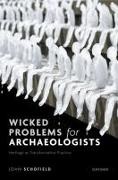Description
Product details
| Authors | John Schofield, John (Director of Studies Schofield |
| Publisher | Oxford University Press |
| Languages | English |
| Product format | Hardback |
| Released | 16.05.2024 |
| EAN | 9780192844880 |
| ISBN | 978-0-19-284488-0 |
| No. of pages | 360 |
| Subjects |
Humanities, art, music
> History
> Pre and early history
Social sciences, law, business > Political science > General, dictionaries SCIENCE / Global Warming & Climate Change, Climate Change, Global Warming, ART / Museum Studies, SOCIAL SCIENCE / Archaeology, Personal & public health, Peace studies and conflict resolution, Peace studies & conflict resolution, Museology and heritage studies, Personal and public health / health education, Archaeological Theory, Museums & museology |
Customer reviews
No reviews have been written for this item yet. Write the first review and be helpful to other users when they decide on a purchase.
Write a review
Thumbs up or thumbs down? Write your own review.

